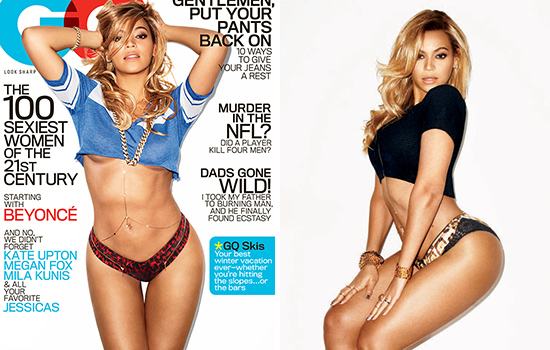
Beyonce almost shut the internet down earlier this week when her GQ magazine cover showing off her supreme sexiness (and a little underboob) was unveiled, and now you can finally gawk at the rest of the photos from the spread, and read up on some things you need to know about Beyonce. Because you can never know too much about Beyonce.
Beyonce is Beyonce’s own biggest critic, and expects Beyonce’s team to be as perfect as Beyonce is:
When she’s on tour, every night she heads back to her hotel room with a DVD of the show she’s just performed. Before going to sleep, she watches that show, critiquing herself, her dancers, her cameramen. The next morning, everyone receives pages of notes.
“One of the reasons I connect to the Super Bowl is that I approach my shows like an athlete,” she says now. “You know how they sit down and watch whoever they’re going to play and study themselves? That’s how I treat this. I watch my performances, and I wish I could just enjoy them, but I see the light that was late. I see, ‘Oh God, that hair did not work.’ Or ‘I should never do that again.’ I try to perfect myself. I want to grow, and I’m always eager for new information.”
When Beyonce is on stage performing, Beyonce’s brain literally shuts off:
She loves being onstage, she says, because it is the one time her inner critic goes silent. “I love my job, but it’s more than that: I need it,” she says. “Because before I gave birth, it was the only time in my life, all throughout my life, that I was lost.” She means this in a good way: When her brain turns off, it is, frankly, a relief. After drilling herself, repeating every move so many times, locking them in, she can then afford not to think. “It’s like a blackout. When I’m onstage, I don’t know what the crap happens. I am gone.”
“Back in the day,” Beyonce used to threaten to beat up boys for bothering Beyonce’s sister Solange, whom Beyonce was very protective of:
Solange recalls how Beyoncé defended her when they were teens. “I can’t tell you how many times in junior high school, how many boys and girls can say Beyoncé came and threatened to put some hands on them if they bothered me,” Solange says with a laugh.
Beyonce is a bit of a feminist:
“You know, equality is a myth, and for some reason, everyone accepts the fact that women don’t make as much money as men do. I don’t understand that. Why do we have to take a backseat?” she says in her [HBO documentary], which begins with her 2011 decision to sever her business relationship with her father. “I truly believe that women should be financially independent from their men. And let’s face it, money gives men the power to run the show. It gives men the power to define value. They define what’s sexy. And men define what’s feminine. It’s ridiculous.”
Beyonce has to constantly remind Beyonce that Beyonce deserves everything Beyonce’s achieved thus far:
“I worked so hard during my childhood to meet this goal: By the time I was 30 years old, I could do what I want,” she says. “I’ve reached that. I feel very fortunate to be in that position. But I’ve sacrificed a lot of things, and I’ve worked harder than probably anyone I know, at least in the music industry. So I just have to remind myself that I deserve it.”
And reminding Beyonce of Beyonce’s accomplishments isn’t too hard. In Beyonce’s conference room Beyonce’s her “sleek office suite in midtown Manhattan” sits Beyonce’s “sixteen Grammys, each wall-mounted in its own Plexiglas box.” Down the hall:
…is another long, narrow room that contains the official Beyoncé archive, a temperature-controlled digital-storage facility that contains virtually every existing photograph of her, starting with the very first frames taken of Destiny’s Child, the ’90s girl group she once fronted; every interview she’s ever done; every video of every show she’s ever performed; every diary entry she’s ever recorded while looking into the unblinking eye of her laptop.
The room, which she calls her “crazy archive,” is also home to thousands of hours of private video footage, compiled by a “visual director” who has shot practically her every waking moment, up to sixteen hours a day, since 2005.
And this room—she calls it her “crazy archive”—is a key part of that, she will explain, so, “you know, I can always say, ‘I want that interview I did for GQ,’ and we can find it.” And indeed, she will be able to find it, because the room in which you are sitting is rigged with a camera and microphone that is capturing not just her every utterance but yours as well. These are the ground rules: Before you get to see Beyoncé, you must first agree to live forever in her archive, too.
Also:
“I now know that, yes, I am powerful,” she says. “I’m more powerful than my mind can even digest and understand.”
And now for the sexy photoshoot:
You’re welcome.
[GQ]














